In 2008, for the first time in history, more than half of the world’s population was living in cities.

Today more than 50% of the world's inhabitants live in cities.
Today is World Habitat Day, and this year’s theme is Changing Cities, Building Opportunities.
World Habitat Day was first observed in 1986. The purpose of this day is to highlight the role of shelter as a basic human right, and reflect on the state of our cities and towns around the world. This year’s urban theme was chosen because cities are engines of growth, and across the globe more and more people are moving into cities in the hope of a better future. According to research done by the Massachusetts Institute of Technology cities make up only 2% of the world’s surface, but they house more than 50% of the world’s population, consume 70% of the world’s energy, and are responsible for the 80% of the world’s carbon footprint. Research from Yale predicts that by 2030 10% of the world’s surface could be urban, most of this expansion happening in Asia… As countries such as India and China with high population growth continue to urbanize and build their cities, urban management plans become vital. There are still many cities in developing countries where housing regulations aren’t followed or enforced. In Kathmandu, for example, twelve-story buildings have been built in areas where structures higher than 45 feet are not permissible.
Urban planning is not only important in securing the safety of the city’s habitants, but also in preserving the environment. Proceedings of the National Academy of Sciences Magazine (PNAS) state that, “urban expansion will encroach on or displace habitats for 139 amphibian species, 41 mammalian species and 25 bird species that are either critically endangered or endangered.”
On a positive note, urban areas reduce commute distances and, therefore, save gas. Shorter distances and public transportation also allow residents to drive less. Urban density also pushes residents to live in smaller homes, which in turn means that less energy is needed for heating and cooling homes.
An extreme form of urban planning is the new concept of “smart city,” that is already applied in a few cities around the world, in cities such as San Francisco, Singapore, and Berlin. Smart Cities are digital cities where access to information and commute routes to offices are optimized, for example. Free, accessible wireless internet access, and an effective recycling system are some of the first steps into a smart city.
To participate in the celebrations of World Habitat Day, post a personal anecdote or idea in the UN Habitat forum on how you have or will improve life in a city. The slogan for this forum is: I am a city changer!

Tags: environment, smart city, sustainability, Urban Development, Urban planning, Urbanization, World Habitat Day

 Hello, I'm Deborah Swallow and, for the last fifteen years, I've worked in over thirty countries addressing the complexities of people working internationally across multiple cultures, so individuals and organisations alike can gain an authentic competitive edge and win in international markets.
Hello, I'm Deborah Swallow and, for the last fifteen years, I've worked in over thirty countries addressing the complexities of people working internationally across multiple cultures, so individuals and organisations alike can gain an authentic competitive edge and win in international markets. 